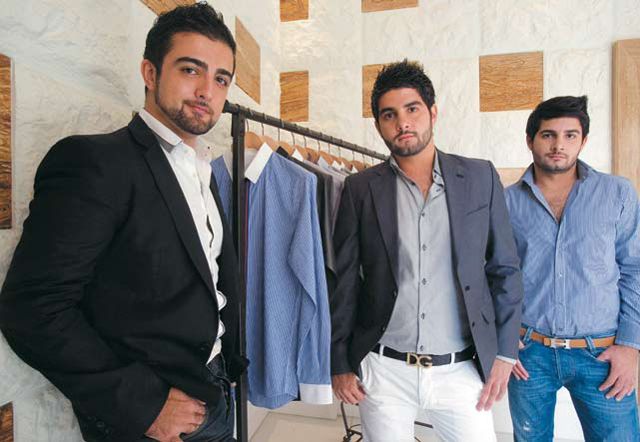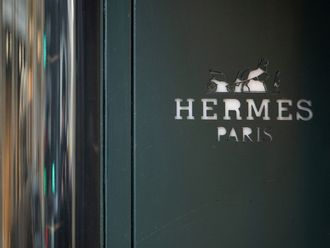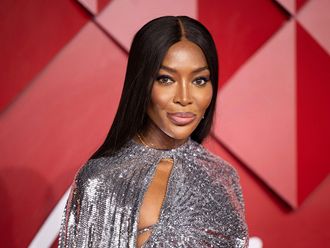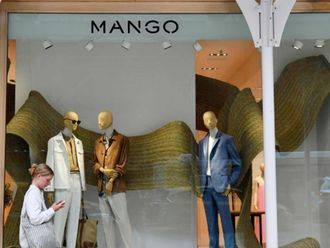There are many perks to my job.
One that is particularly noteworthy is of course, meeting a smorgasbord of people successful in their various rights. But on the rarer occasion you meet those who are not only successful, but charismatic, easygoing, humble and, above all blessed with impeccable style and - dare I say it - enough charm to reduce any self-respecting woman to bits and pieces (It's that British-Iranian combination, I tell you).
Babak Golkar, 27, and his younger twin brothers, Haman and Farhan, 23, are the epitome of professional, savvy Dubai wunderkinder. The accomplishments of the trio in their few short years as entrepreneurs of their fashion label, Emperor 1688, are enough to leave most people twice their age arching their eyebrows in surprise.
They're sharp, witty and are talented in not one, but several specialisations. Oh, and did I mention they not only cut a fine suit, but carry one off just as admirably?
But none of this would mean very much if it weren't for what I found to be their most defining and indelibly delightful factor: their humour. "Ah, it's a James Bond piece of wizardry!" exclaims Babak at the Dictaphone.
Tee hee [blush].
We exchange a few laughs amidst apologies at the fact that they sent me a sample of a man's shirt, not knowing that I am a woman. "With an androgynous name, it's an easy mistake to make," I appease.
It's their turn to blush.
I mumble a confession that it's just too beautiful to sleep in.
But, with a women's collection on the cards within the next few months, they'll soon have another base covered. And given the boundless success thus far with their men's line, they are at their creative peak.
A string of accolades
Babak Golkar graduated with honours from the prestigious London College of Fashion. Haman attended Central Saint Martins where he studied Product Design and Graphic Design, while twin Farhan studied graphic design at the Chelsea College of Art and Design.
Babak explains how they conceived the business: "After we graduated, we decided to put a brand concept together and incorporate all of our ideas. The point of the brand is to give luxury to men's clothes, specifically men's shirts."
I enquire as to the origin of the brand name and identity. "We felt that Emperor really summarises a sense of luxury. 1688 comes from a time when there was a lot of cultural reform in Iran and artistic forwardness. It was one particular Emperor that we often heard about - Nader Shah, who was born in 1688. Growing up, we were constantly aware of his influences in art and culture, because he was an iconic figure in Iranian history. 1688 also happens to be a lucky number in Chinese culture, but we didn't know that at the time!" says Babak.
So what brought about the move from fashion hub London to its cosmopolitan competitor, Dubai?
"We moved from London to Dubai because our parents are based here," says Farhan.
"We received tremendous help from our father in terms of financial backing. Initially, we made tailor-made shirts for friends and family and then we decided to make a brand out of it. Given our growing clientele of personal clients, we decided two seasons ago to turn it into a ready-to-wear retail brand. We distribute in Qatar, Dubai, Abu Dhabi and Syria and we're expanding rapidly into other high-end boutiques in the Middle East. In November, we will be stocking our label in Saks Fifth Avenue, which we're very excited about."
Slowly but surely, they're expanding the brand - one continent at a time. Having started in the Middle East, the trio is now working at setting up in Europe.
"In terms of a business model, we work with fashion houses in Europe. We set up shops, create the collections ourselves and then have sales campaigns. Because of our experience in Western fashion boutiques, we follow the same fashion seasons as Europe," explains Farhan.
Emperor 1688 is grounded on the philosophy that the man is a traveller, constantly roaming from border to border, trying to understand other cultures and constantly having to adapt it to his very specific, mature cosmopolitan lifestyle.
"Being British-Iranian, we have that cross-boundary cultural influence," says Babak.
"The bird in our logo came into play alongside the idea of crossing boundaries, crossing cultures and being exposed to different languages. The idea is that the modern man cannot be chained to one particular group - he cannot be readily defined. I think our brand appeals to people because they can relate to that. Yes, we incorporate very structured British tailoring but we combine that with Iranian fabrics and specific global trends."
The Golkar brothers explain that their incorporation of symmetry in their designs is a result of the extensive influence that they draw from Middle Eastern architecture and particularly the iconic buildings of Dubai.
Last season they drew inspiration from the Islamic museum in Doha, the shapes and arches reflecting in their designs heavily. They also drew much inspiration from the architecture of DIFC. "Dubai really sums up having heritage but introducing modern and contemporary ideas and trends at the same time," says Babak.
"In any business, it's difficult to get started, but luckily, our father saw the potential in our idea," says Babak. "Opening a business is not without myriad challenges. You can work anywhere from nine hours to 24 hours a day. We're designing, managing and marketing all at the same time."
It may surprise many that they do not stem from a fashion or design background. Their father is an IT entrepreneur and their mother is a skin therapist who also started her own business. Being brought up in a creative environment, yet still being able to translate their creativity into a product and a sellable brand is very important to the brothers, who attribute this predisposition to the way they were brought up.
"That bridge is very important and I think that without the influence of our family, we would not have made this transition as easily and as coherently," says Babak.
Despite their acknowledgement of the importance of creativity and originality in their designs, they remain grounded and conscientious of the realities that accompany running a new business.
"Our concept and our images of fashion may be fantastic, but at the end of the day, being able to translate them into a product that the average Joe wants to buy, is more important," says the seasoned Babak.
"To be honest, I think we have a dual perspective because we want to create something that is completely original and visually pleasing. It gives us much pleasure to walk past a man wearing one of our shirts.
"The whole business has been very exciting. The average person will look good in our shirts, and that, at the end of the day is what we want," he says.
Defining the modern man's style
Men's fashion has developed and of course changed over the years, but one thing that hasn't is the shirt as a constant, statement item. About 50 per cent of any man's wardrobe - anywhere in the world - comprises the shirt.
From daywear to beachwear, to office and evening garb, the shirt remains reliable, and this is what they have tapped into. "We're shirt kind of guys," smiles Babak. "The shirt is classic and timeless."
What are their approaches to dealing with fluctuating trends and the ever malleable modern man's identity? Babak has a ready answer: "My perception is that during times like these, men are being less experimental. They're returning to more traditional trends when it comes to garments.
"We have to adapt to change, and if I think back, two years ago we were being really experimental. We toyed with really different designs, triple collars and wild colours and print. But we have to adapt to what the man of ‘now' wants. We're seeing a return to classic style and to quality."
And what's the X-factor that they have that will increasingly make them stand out above the highly volatile and cut-throat world of fashion?
"I think we have a following because we know what the modern man wants - we have three very real perspectives of that - and we're dogmatic when it comes to quality assurance," says Babak.
All Emperor 1688 fabrics are from Italian mills in the tradition of Dolce and Gabbana and Valentino. They use raw silks exclusively from France. And their designs are classic and long-lasting.
"We make sure that whatever the trend, we focus consistently on the quality," affirms Haman.
The dynamics of men
Men are in tune with power dynamics, or at least are in the know of what makes them confident, says Babak. "I don't know any man that doesn't feel immediately more confident and more powerful when he's wearing a beautiful suit," he says.
"Your clothes immediately reflect you and present the character you are or who you aim to be. I think that men are much more loyal to this understanding."
Lifestyles, circumstances and trends might all change in time - a change of job for instance, or a change of location - but the brothers say that they will always adapt to the industry.
It is a business philosophy that goes beyond business survival - for them, loyalty to their clients and maintaining their faith in their abilities to meet their needs, is priority.
"We value trust," says Babak simply. "We do base a lot of our designs on our tastes. If we'd wear it, we like to think that the majority of other people would too. We try to cater for a reachable audience."
Working as a unit
The boys are a very close family unit - with their parents and as siblings. They spend a lot of their time together and bounce ideas off each other very easily. There are no barriers among them and this evidently, is most conducive to fluid creativity.
"We're always open to ideas," says Haman. "We understand each other enough to bounce ideas off one another. I don't necessarily agree with the concept of surrounding yourself with people who agree with you all the time, but the good thing about us as a team and as a family unit is that we can disagree, but we are open enough to see where the other is coming from. We give each other the chance to explain ourselves and our ideas."
Their styles are all very different, but they have all meshed together to create their business and a very clear-cut identity. They understand what the other likes and dislikes. As they explain, they might not relate to it individually, but they can still appreciate the other for their unique brand of creativity and the ideas that are brought to the table.
"Again, I think that this reflects us being British-Iranian. We have to compromise both sides of our character," says Babak. "We greatly value the fact that we have different perspectives," adds Haman.
Designing for women
"Firstly, we wanted to establish ourselves with the menswear range. But our women's wear range is being developed [and will soon be] ready to launch," says Farhan.
They say that they are following the same principles with the women's wear that they have established with the men's range.
They still want to focus on shirts, shirt dresses and keep the style tailored and classic. In fact, Babak's initial design interests lay in women's wear, so he is particularly eager to launch into this market.
"A good shirt should be a ‘staple diet' really in every man's wardrobe but it is something that women like to wear as well," says Haman. "Of course we've just had the shirt as a starting point, but the idea is to expand into an entire closet range, and eventually, a home range."
They've already done a women's wear collection last winter with Splash (Nexus), which was well received, and so have already emerged to a degree into women's wear.
Their mother is a great source of inspiration to them and is in many ways a muse for their women's wear collections. "Our mum has fantastic style," says Babak. "She is always immaculately presented for every hour of the day, whatever the occasion. When designing we often use her as a point of inspiration, thinking, ‘What would it look like on her?'"
Looking ahead
"Ideally, our goal is to have a lifestyle boutique, which will be something like ‘The Emperor's club,' [playing off the idea of the gentleman's club]. We want to integrate clothing, accessories and lifestyle items," describes Babak.
Right now, especially in retail, there are so many options available to people. But personal interaction has been lost in the process. The trio are driven at reviving what they believe to be a dwindling phenomenon in business. "I think that personal interaction between the client and the salesman has sadly become a rarity," says Babak.
"We want to give back a personal relationship to our client. We want to get to know them as far as possible. We have clients who we have never met, but they e-mail us with ideas and suggestions for specific garments, and we like the fact that we can cater to individual needs."
As the brothers explain, luxury - particularly in cities such as Dubai - is readily available. But when it comes to customer service, the Golkar brothers want to ensure that they maintain strong links with their clientele and forge life-long relationships.
They meet with their clients for lunch or coffee when they are in town, because they value that special connection, which to them, is priceless. "We have a guy's guy relationship with our menswear clients," says Babak.
"It's good for business, and most importantly, we have a lot of fun while doing it."













